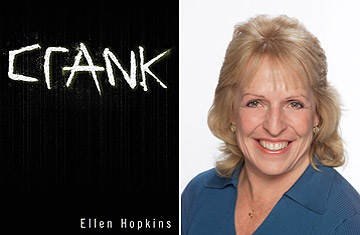
Each winter, Humble Independent School District, located in a suburb northwest of Houston, hosts a literary festival. The all-day celebration of books, which alternates yearly between a children's literature and a teen lit event, has quickly grown into one of the nation's leading festivals. Last January's "Peace, Love & Books" gala at Creekwood Middle School featured nationally acclaimed authors and illustrators and drew hundreds of children and families, despite the damp weather.
But this school year, there will be no such celebration of books. Not because of budget cuts, and certainly not because of lack of interest. This school year's teen literature festival has been canceled because of a string of events that followed the banning last month of best-selling young-adult author Ellen Hopkins — just in time for the controversy to ripen for Banned Books Week, which is commemorated during the last week of September.
Secular and religious authorities have been attempting to ban books ever since people have been writing them. In Germany, where Johann Gutenberg invented the printing press, the first official censorship office was established within decades of the innovation. In the U.S., Anthony Comstock, considered to be the pioneer of modern American censorship, persuaded Congress to enact the Comstock laws, which banned the mailing of materials found to be "lewd, indecent, filthy or obscene." Under those laws, the works of literary giants such as Ernest Hemingway, F. Scott Fitzgerald and John Steinbeck were censored. Nowadays, beloved characters ranging from Harry Potter to Captain Underpants are frequent targets of censorship.
But banning authors?
"Banning authors isn't the same as banning books, but the intent is the same," says Hopkins, whose most recent novel, Fallout, the final volume of her Crank trilogy, just debuted at No. 5 on the New York Times series list (which is devoted to series of three or more). The trilogy (which also includes Crank and Glass) has been lauded by educators and reviewers alike. Its popularity among teens is rooted in Hopkins' pull-no-punches story lines that tackle issues such as crystal-meth addiction, teen prostitution, suicide and incest.
But it's her no-holds-barred approach that has ignited the current controversy. Upon learning that Hopkins was scheduled to speak at this school year's festival, several parents complained to the school board. The superintendent, after consulting with the head librarian, instructed the festival's organizers to remove Hopkins from the roster and rescind the invitation.
Since her books are available in Humble libraries, and because she had appeared at high schools in the district last year, Hopkins was shocked by the snub. After much soul-searching, she reached out to the other young-adult authors who were scheduled to participate. Pete Hautman, who in years past had been disinvited from appearances elsewhere after his work was deemed "inappropriate," withdrew from the festival. Then, in a show of solidarity, Matt de la Pena, Melissa de la Cruz, Brian Meehl and Tera Lynn Childs all followed suit. The district, in turn, canceled the event altogether. "As authors," Hopkins recently blogged, "we must maintain a unified voice against the idea that one person, or even a few, has the right to decide for everyone else what they are allowed to read, or what information they can have access to."
Hopkins' banning and the resulting boycott lit up the blogosphere and social-network sites. Several industry publications rushed to the author's defense, and a letter of protest from six national organizations, including the National Coalition Against Censorship, the Society of Children's Book Writers and Illustrators and the National Council of Teachers of English, excoriated the superintendent for violating "basic constitutional principles." "Those kids surely lost out," Hopkins notes. "However, those same kids will now view censorship through completely different lenses, and I hope they understand why authors must defend the ability to write books without fear of would-be censors."
Hopkins' critics questioned whether a formal invitation had ever been extended and contended that a disappointed author was merely throwing a bruised-ego tantrum. Yet Hopkins says she had negotiated the terms of her appearance and received a confirmation e-mail from a festival coordinator. Still, her critics apparently saw little value in young people reading about such edgy and unpleasant topics.
"When middle school parents challenge books, it's often a last gasp to stay involved," says Camille Powell, a Houston area school librarian whose BookMoot website is a go-to destination for educators and kid lit aficionados. "Elementary schools are fairly responsive to parental input. However, the junior high transition years are frustrating and difficult for parents as their control over their children and the school gradually erodes."
Like many, Powell was disheartened by the turn of events in Humble. However, she remains hopeful that the festival can be salvaged and believes the opportunity exists for a valuable teaching moment. "There could be a forum," Powell says, "where parents would be able to ask questions, raise concerns and share views and opinions. What could be more worthwhile than an impassioned, thoughtful tussle over books and how they affect us?"
Hopkins says she'd welcome the chance to participate in such a discussion. "I would pay my own way," Hopkins says. "We need to take back the dialogue. A misguided few cannot be permitted to dictate what's best for an entire community. These young people are depending on us."
